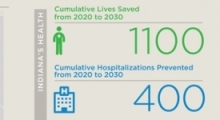You are here
Science Policy Exchange Collaborators Voice Public Comment

On December 1, researchers from the Harvard Forest were among a group of seventeen scientists to submit a public comment to the EPA's proposed Clean Power Plan. The effort was coordinated by the Harvard Forest-based Science Policy Exchange.
In the comment, the scientists summarize the benefits of a strong carbon standard for air quality and human health. Their remarks are based on recent reports led by Exchange partners Syracuse University, the Harvard School of Public Health, and the Boston University School of Public Health. Their air quality research shows that a strong carbon standard can significantly reduce several pollutants, including soot and smog, which have important consequences for public health. The expected declines in soot and smog could save 3,500 lives per year nationwide, starting in the year 2020.
Such benefits will be possible if the EPA adopts a carbon standard similar to their Clean Carbon Plan proposed in June 2014. However, if the final proposal for power plant improvements does not include energy efficiency upgrades to reduce carbon dioxide, soot and smog will not decline, and the U.S. will not experience air quality and health benefits. In fact, in some regions soot and smog could increase under a weak carbon standard, according to the air quality report.
- Read the scientists' public comment.
- Explore the Exchange's air quality estimates and maps.
- Browse county-by-county and U.S.-wide health benefits based on relationships between air quality and health.

